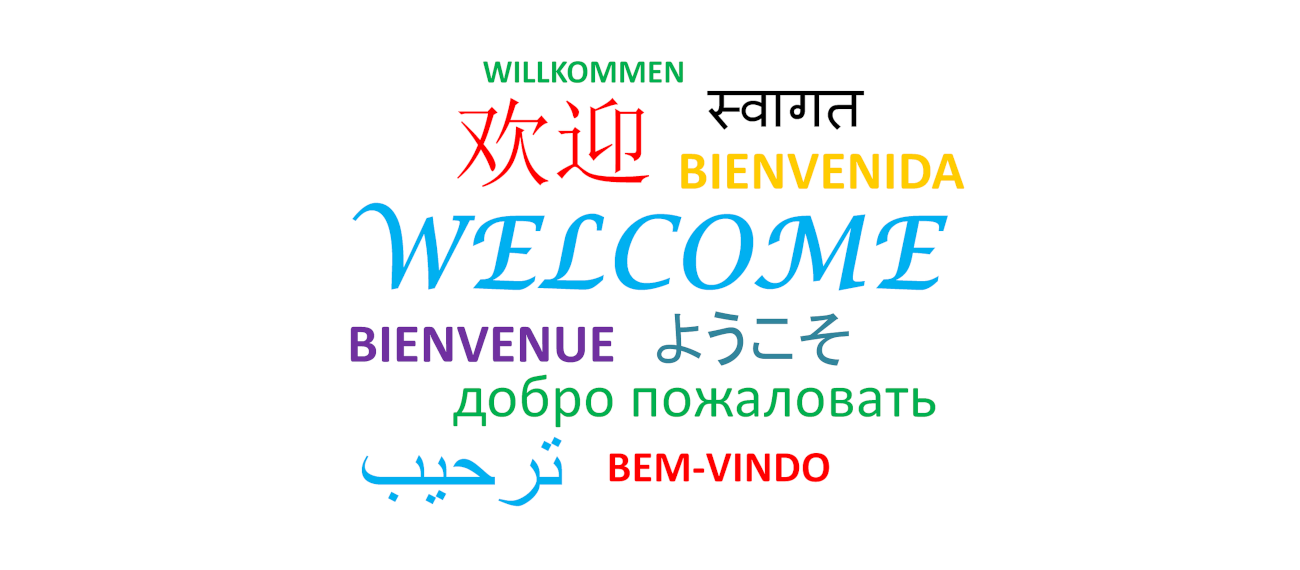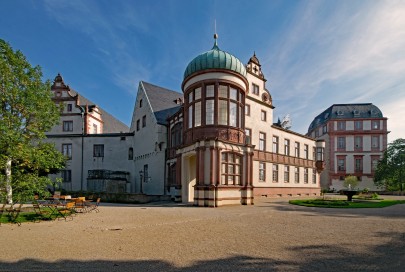Dear Freshers,
We are happy to welcome you at the Department of History and Social Sciences at the Technical University of Darmstadt, because (at least) one of your degree programmes or subjects is at home at one of the department's institutes.
To which institute does my degree programme belong?
The most important thing at first: It's great that YOU ARE HERE :-)
You have a lot of questions about the structure of the university, about your degree programme, about the orientation at the department, about the process of your degree programme and about many other things? No problem, we won't leave you alone and will help you to find your way around as best we can. For your questions in the various areas, there are usually different offices that can help you. On this page, we try to provide you with the most important information in order to give you a good start into your studies and a good arrival at the department and at the TU Darmstadt. However, if you are looking for something that you can't find here, don't hesitate to contact us!
And don't forget to come to the orientation week!!!
Your team from department 02
On this page…
When you start your studies, you will be overwhelmed with new impressions, terms, programmes and to-dos. On this page, we try to structure all the confusion and help you to keep an overview of the start of your studies.
In the Starting List under the point Basics (first steps), we describe the very first steps, information and to-do's that are basically important for every new student at the TU Darmstadt.
The Orientation section provides you with a special introduction to our department and your field of study and also presents essential information on starting your studies and finding your way around. In addition, the paragraph offers you a spatial orientation for the university buildings.
If you are still fresh out of school and have not yet gained any university experience, we will explain to you under General Information (structure of the TU..) how the TU Darmstadt and the department are structured, where you will find yourself among the approximately 27,000 TU members and we present some organisations and contact points for organising your studies.
Finally, we've put together a range of Support services for you to use with any university-related problem and to help you find the right solution for the issue at hand.
What was the/the/the… again? At the bottom of the page you will find a list of the most important terms and abbreviations and its explanations.
Starting List
You've made it this far; you applied, were accepted and are now enrolled. But what exactly happens now?
In this section you will find the first steps and basics that every student needs and must take at the beginning.
TU-ID
The most important and top priority is to set up and activate your TU-ID. It is your personal digital “identity” at the TU and serves as authentification and key for all kinds of (digital) access. You should get your TU-ID before the OWO, because you really need it everywhere. ALL TU members have a TU-ID.
TU e-mail address
Immediately afterwards, you should set up your TU e-mail address, as the university will only keep in touch with you via this e-mail address and you will only receive important news concerning you and your studies via this address.
The form is mostly “firstname.surname@stud.tu-darmstadt.de”.
You can either set up a forwarding to your private e-mail address or use a TU´s own mailbox.
TUCaN
TUCaN is the central organisation system for courses and examinations at the TU and you can use it to organise your everyday university life. Nothing works at the TU without TUCaN (registration with TU-ID). You can use it to register for modules, courses and exams, as well as to receive information about last-minute changes to courses or to create a “timetable”. There are video tutorials and there will also be introductions to TUCaN during the OWO. If the university or a lecturer wants to inform you about changes to a course at short notice (“Lecture cancelled today…”), this is done via a TUCaN system message. It is therefore advisable to have these messages forwarded directly to your TU e-mail address. By the way, TUCaN is also available as an app. (TUCaN direct link)
Athena Card
The Athena card is a personalised chip card that combines many functions. It is your “physical” ID at the TU, similar to the TU-ID in the digital space. For example, you can use it to pay in the student canteen (Mensa), borrow books, use lockers, print in the PC pools and much more… It makes life on campus much easier.
Technical Requirements
No studies without the appropriate technical requirements. But there is also support from the HRZ and HDA for all digital matters. Of course, the most important thing is a personal computer (or laptop) with “stable” internet access. On campus, you have access via the TU's WiFi (“eduroam”), so you always have good access to the two main platforms TUCaN and Moodle. With the VPN, you have access to the electronic media of the ULB and the HRZand the HDA also offer a range of free software for your studiesMS Office (Office Software),TU campus licence for Zoom, antivirus software, cloud storage “Hessenbox” (30 GB) and others (HDA Toolbox) (HRZ Campus Software).
Orientation Week (OWO)
All departments at TU Darmstadt, including our Department of History and Social Sciences, offer their newcomers an Orientation Week (OWO) at the beginning of their studies. It takes place regularly in the winter semester in the week before the lectures start and should not be missed! (For more details, see the Orientation section below). This year it is from 06.10.2025 to 10.10.2025. On the one hand, everything important that is written here is repeated here, and on the other hand, the special introductions for the individual degree programmes are given. In addition, you will get to know the departmental student body and representative committee (Fachschaft), which will help you with any questions you may have, offer you its own orientation services and give you many opportunities to get to know fellow students… because networking is (almost) everything in university life, too.
Summary
If you have worked through the above points under Basics, the technical equipment is suitable and you then participate in the orientation week, you will have made the best possible start to your studies and a good arrival at the TU Darmstadt and the Department of History and Social Sciences, and you are ready to go!
You can also read up on all these things again on the TU homepage, there on the page Getting started at TU Darmstadt. The HRZ also has its own checklist for starting your studies.
And the institutes of the department, where at least one of your degree programmes or subjects is located, also welcome you on their own pages. Just click on the small boxes for the respective institute at the top right of this page.
A lot of information will be duplicated and you will hear some of it several times. The more often you hear something, the more important it will be (TU-ID, TUCaN, Moodle, Mensa, Schlosskeller…). In any case, you are well and sufficiently equipped with the basics, the technical equipment and the OWO.
If something is still uncertain, you will find the necessary help in the Support section.
The central welcome and orientation events take place during an Orientation Week (OWO), which you should not miss by no means!
This year it will take place from 06 – 10 October.
At the beginning of the OWO, the department's central interdisciplinary welcome event takes place, to which all new students are cordially invited
During the week, the various institutes organise the specialised presentations for the respective degree programmes.
The departmental student body and representative committee also offers welcome and get-to-know events during this week and also flanks these with helpdesks and many other support services.
For more detailed information and the plans, there is a separate OWO page!
Spatial orientation
When you walk through Darmstadt, you may notice small red signs on some buildings. These signs indicate that the building belongs to the TU Darmstadt. The letter describes the campus (S = Stadtmitte, L = Lichtwiese, B = Botanischer Garten, etc.), the number directly behind it describes the area (S1 = Stadtmitte Mitte, S2 = Stadtmitte Nord, etc.) and the number after the dash describes the building (S3|13 = Stadtmitte Süd, building 13). This information is also used in the course catalogue. The number that then follows finally designates the room, whereby the first of a three-digit number usually indicates the floor.
E.g.: S3|13 223 (Stadtmitte Süd (incl. Residenzschloss), Building 13, Room 223 (on the second floor)
Our department including the institutes is mainly located in the castle (Residenzschloss) in the buildings S3|12, S3|13 and S3|15.
S1|01 is the TU reception building (Karo 5) and room A1 is the Audimax.
Here you can find a complete overview of all areas of the university.
For even better orientation you can also find a campus navi.
If you're completely new to Darmstadt, the computer science student representative committee has a digital city tour for you (german).
The Technical University of Darmstadt is like a small cosmos of its own with approximately 27,000 members, in which students, researchers, lecturers and staff do just these things. Like any university, it is characterised by the central tasks of research and teaching. It is run by the Executive Board and the associated institutions. For this purpose, the university is mainly divided into the 13 departments, the interdisciplinary units (e.g. the fields of study or the research fields), the central administration and the central services (e.g. the University and State Library or the University Sports Centre).
Our Department 02 – History and Social Sciences is one of these 13 departments and is further divided into 5 institutes, in which at least one of your degree programmes is located.
As a student, you will primarily have to deal with the institute where your degree programme is located. You will also come into contact with the department's office for student affairs, for example when it concerns examinations.
You´ve had contact with the central administration, here with Directorate II, during the application process. The Student Service and the Central Student Advisory and Orientation Office (ZSB) can also be found here, as they are interdepartmental contacts for all students. The International Student Services (ISS) for international students is also located in Directorate II. You will probably have fewer contacts with the interdisciplinary units.
You can get in touch with the central services, for example, when you apply for your TU-ID and have technical questions (HRZ), with the University Sports Centre if you want to do university sports, with the ZfL if you have started a teacher training programme, and last but not least with the ULB if you need a textbook or two during your studies ;-)
So much for the general structure of the TU Darmstadt and your situation at this institution “university” in your new life as a student.
The TU Darmstadt in general and the Department of History and Social Sciences in particular have a range of support services available for you, depending on your concerns.
Good to know: On almost all websites of the TU Darmstadt, you will find a contact button in the top right corner under the large picture, where you can find the respective contact persons or addresses.
Counselling and information
Formalities and application (TU Darmstadt in general):
Questions about enrolment (“I haven't received any access data yet…”) and about the semester ticket can be answered by the Student Service at:
studierendenservice@tu-…
Questions about the application:
bewerbung@zv.tu-…
on the application process for Master's degree programmes:
master@zv.tu-…
And the International Admission for applications with international university entrance eligibility:
international.admission@zv.tu-…
Information About the Student Service
Information about the International Student Services
Degree programme and subject (Department and Institutes)
The first point of contact for specific questions about the degree programme is the so-called “Fachstudienberatung” of the institutes where the degree programme or subject is located:
Institute of History: detlev.mares@tu-…
Institute of Philosophy: jens.kertscher@tu-…
Institute of Political Science: studiumpolitik@pg.tu-…
Institute of Sociology: studienberatung@ifs.tu-…
Institute of Linguistics and Literary Studies: florian.ostertag@tu-…
For formal matters such as examinations and examination regulations, modules, courses and their registration/deregistration, illness notifications, grades and performance records, the departmental Office for Student Affairs is responsible:
Departmental student body and representative committee
The students in the departmental student body and representative committee can also be contacted at any time if you have any questions about your studies:
Technical issues, portals and software (HRZ and TU Services)
The University IT-Service and Computing Centre offers support for technical questions, e.g. regarding TU-ID, e-mail and WiFi, and provides a range of helpful software for studying.
Checklist with all important things for the start.
Support/FAQ/Instructions:
- Online platform TUCaN
- Schedule Creation with TUCaN (Video-Tutorial)
- E-learning platform Moodle(german)
- WiFi (eduroam)
- VPN (secure internet connection)
- Zoom (online meetings) (german)
- Hessenbox (cloud storage)
- Microsoft office (office software)
- Other (software) tools for studying
Assistance and support for special situations
Counseling on problems at the beginning and during studies
The Central Student Advisory and Orientation Office (ZSB) offers students (confidential) counseling and support services, e.g. if one has doubts about one's own choice of study or needs help and orientation regarding motivation or one's own expectations….
Counseling, advice and assistance with matters pertaining to student life.
The Studierendenwerk Darmstadt helps with many things and problems that may arise outside of just studying.
Assistance/Support:
- financing: e.g. student credits and jobs
- housing: Accommodation service
- personal problems and conflicts: Social Counseling
- legal questions: Legal Counseling
- acute crises: Psychological Counseling
Special situations and support
Studying with children: Service Point studies with children
Part-time studies:
member of staff responsible for disability issues,
(Almost) barrier-free studying at TU Darmstadt (only german version available)
Service Point part-time studies
Social Counseling Studierendenwerk Darmstadt
Others
Help and support around academic and scientific writing: SchreibCenter
Building study skills (study techniques), supporting fellow students (tutors), learning tools:
Visit Studying from A to Z for more information throughout your studies.
Orientation programmes for international students for a successful start at TU Darmstadt.
Important Notice
If you are a first-year student of the teacher training programme for teacher training certificates (Ex: LaG or B.Ed. / M.Ed.), the Centre for Teacher Education (Zentrum für Lehrkräftebildung, ZfL) and the departmental student body and representative committees already have special orientation offers ready for you in the week of 29. September – 02. October.
- Athena Card
-
The Athena Card is more or less your ID card at TU Darmstadt. You can use it to make cashless payments in the student canteen (Mensa), borrow books from the ULB, top up your print account and much more.
- TU-ID
-
The TU-ID is your central identification number and key at the TU Darmstadt, which accompanies you throughout the entire studies. You need the TU-ID to register for modules and exams in TUCaN or on the Moodle learning platform. With the TU-ID, you can also read internal information pages that are activated for students of the TU Darmstadt.
- TUCaN
- Moodle
- Department
-
There are 13 departments at TU Darmstadt, divided into engineering, natural sciences and humanities, to which our department, Department 02 - History and Social Sciences, also belongs.
- Institutes
-
Our department comprises five (full-fledged) institutes and one separate institute. The Institute of History, the Institute of Philosophy, the Institute of Political Science, the Institute of Sociology, the Institute of Linguistics and Literary Studies and the separate Institute of Theology and Social Ethics. Your degree programme or subject is located in at least one of these institutes.
- Departmental Office
-
The Departmental Office is the management of the department. The Department of History and Social Sciences is headed by the Chairperson, the Deputy Chairperson and Internationalisation Coordinator and the Vice Chairperson, Academic Affairs, who are elected by the Departmental Council for a period of two years. They are supported by the Department Managing Director as contact person for all members of the department, the university and external cooperation partners.
- Office for Student Affairs
-
The Office for Student Affairs is the central administrative unit for students in the department. The team supports you with all administrative questions and matters concerning your studies, e.g. with the organisation of courses and exams.
The departmental Office for Student Affairs also helps students and lecturers with questions about the course catalogue, TUCaN, modules and courses, examinations and grades, examination regulations and transcript of records.
- Student Service
-
The Student Service is part of the central administration of the university, so it is responsible for all students in all departments and helps you with general questions about the administration of your new status as a "student".
The Student Service is responsible for all matters relating to application and admission (German university entrance eligibility), enrolment (matriculation), changing degree programmes, including transfer from Bachelor's to Master's (German university entrance eligibility), semester fees, re-registration, leave of absence, de-registration, enrolment certificates, issuing accreditation/ duplicates and legalising certificates, confirmation of study periods for pension providers, health insurance fund and guest students and their administrative procedures.
- Departmental Student Body and Representative Committee
-
The student body and representative committee represents the students of a department. The students in the student body work on a voluntary basis and are involved in the various governing bodies of the department and the university and represent the interests of the students. In particular, they support the organisation of studies, organise the OWO, and serve as student contact persons "at eye level".
- Course Catalogue
-
The Course Catalogue (VV) contains all courses at the TU.
You can find the current Course Catalogue of the TU Darmstadt on the homepage of TUCaN (go to). With a few exceptions, the course catalogue is freely accessible without a TU ID.
- Central Student Advisory and Orientation Office (ZSB)
-
The ZSB is the Central Student Advisory and Orientation Office and your first port of call for counselling and orientation! In addition to information and orientation, the ZSB also offers support in the independent development of individual solutions if it comes to a halt in your studies.. It is the first point of contact for problems during your studies, especially in the first semesters.
- Regulations of the degree programme
-
TheRegulations of the degree programme are guidelines governing the structure and contents of a specific course of studies.
Regulations of the degree programme list the prerequisites for the respective degree program and the necessary academic achievements. Apart from that, the individual modules of a specific course of studies are listed.
In addition, the regulations contain information on the possible types of examination (written exam, paper, oral exam, etc.) and in which areas you have to take examinations or present other academic achievements.
- Study and Examination Plan
-
The study and examination plan is part of the regulations of the degree programme and provides an overview and non-binding recommendation in the form of a table of which courses can be taken or completed in which semesters in a respective degree programme.
- Centre for Teacher Education (ZfL)
-
The Centre for Teacher Education (ZfL) offers a broad and diverse range of services to the various target groups involved in teacher education. If you are studying a teacher training programme (LaG, LaB), you will have contact with the ZfL.
- University IT-Service and Computing Centre (HRZ)
-
The University IT-Service and Computing Centre (HRZ) is a competence and service centre for information technology (IT) at TU Darmstadt and provides and supports the central IT services for research, teaching and studies.
- Center for Educational Development and Technology (HDA)
-
The Center for Educational Development and Technology (Hochschuldidaktische Arbeitsstelle – HDA) is a central service of the TU Darmstadt. With its divers competencies and joint partners, the center promotes and supports good studying and teaching. The HDA inspires teachers and students and develops innovative approaches for all teaching and learning environments at TU Darmstadt.
- Audimax
-
Audimax is short for "auditorium maximum" and usually refers to the largest lecture room at a university. However, there are now larger lecture rooms at the TU Darmstadt.











